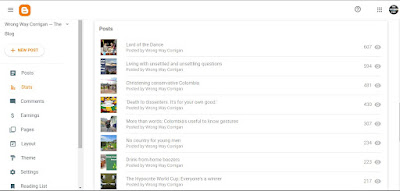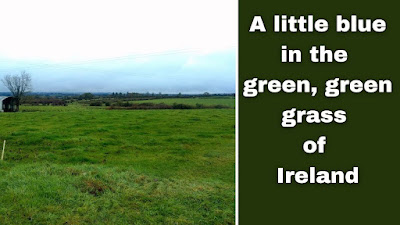[For an audio/vlog version of this story, click
here.]
'You don't know how easy you have it. In my day, life was far worse.'
This is one of the standard ripostes from older folk when they hear youngsters complaining about how bad their current situation is. While this
Digital Age has its unique challenges, things were far
tougher in the past, so it goes anyway.
 |
| Bigger isn't always better. |
This, though, depends on how one defines what
tough is.
For
there are measures, open to much interpretation as such things are, that suggest that millennials from some high-income nations are set to be the first generation in modern times to be less well-off than their parents.
Personally, comparing my
wealth and assets to my father's, this less-well-off interpretation seems about right.
Coming up to his 39th birthday, whilst already the father of six children and with two more yet to come, myself included, my Dad was in the process of building his own house on the land of the family farm he inherited.
For me
right now, two months away from turning 39, it's highly unlikely I'd get a mortgage approved to even consider buying a dwelling. (For the record, I haven't even looked into it because I'm not sure where I would like to own property, if I want to at all that is. Also, many Irish in my age cohort who opted more for
settling down rather than a life of adventure abroad appear to be on a steadier financial footing.)
Generation game
Of course, comparing generations, particularly those born in the late stages of the Technological Revolution and into our current Digital Age, is fraught with complications due to the rapid rate of change in almost all aspects of life.
The household my father was born into in 1943 was rather different from the one I came into just 42 years later.
Where in his mid-teens my Dad was England-bound for an early life of toil in construction, my main concerns at the same age were football and the secondary-school leaving certificate. And I could fret about such matters from the comfort of the family home.
'It's understandable that when more prosperous times came along, these older generations were mesmerised by the materialism that presented itself to them.'
In my early twenties, with a university education
already completed, I was able to abandon my budding media career to go
travelling around the world. Such opportunities were largely unheard of for somebody of my father's background.
Now, an argument can be made that the
less mollycoddled youth that my father and most of his peers had to go through gave a more realistic picture of life's struggles and was thus more beneficial in the long run.
Nonetheless, what few of that generation had was a choice. I, on the other hand, had various options open to me. In most instances, that's a positive (there are times, though, when I think
it would be better not to have too many options).
Material world
So, when those born in the 1940s, 50s, 60s and even 70s say that they had it
tougher growing up than those of us who came later, this is hard to argue against from a technology and access-to-resources perspective.
Seen in such a light, it's understandable that when more prosperous times came along, these older generations were mesmerised by the materialism that presented itself to them.
In Ireland, we saw this to an extreme extent during the Celtic Tiger years, something I touched on in a 2012 blog story titled,
On the road again, naturally.
Some in the country went from what was little more than subsistence living to a life where they couldn't spend money fast enough — borrowed at cheap rates as much of it was.
'More, more, more' and 'bigger is better' were the mantras. And many got quite comfortable with their new comforts.
When the faecal matter hit the ventilator of Ireland's Celtic Tiger boom, some realised the
error of their ways. Well, it was more a case that the financial reality was laid bare.
Yet, letting go of the lavishness hasn't been easy. And from my observations, it's the older generations who are more reluctant to do away with rather unnecessary home comforts and associated excessive waste. (Although,
hypocrites abound across the generations when it comes to calls to 'reduce, reuse and recycle'.)
The heat is on
To be clear, I'm not calling for a return to something resembling a caveman existence. What I am saying is that many in the comfortable classes could downsize in a host of areas and not really suffer from it.
In fact, doing without certain mod cons might actually improve our quality of life and reduce our carbon footprints.
For example — referring to Ireland and similar countries here — rather than crank up the heating in winter time,
there is evidence that suggests having a naturally cooler house may have health benefits. So, where possible, stay warm by being active rather than relying on home heating.
Do note, it's usually easier and more cost-effective to keep warm in a smaller dwelling, too. Does one really need that five-bedroom dormer?
I've let it be known many times before — see my previous story
Me, myself and I, for one — that some people could do without cars, that they have them more for convenience than necessity.
Now, I hasten to add that
I have previously acknowledged that going without a car is easier to do in cities or areas with reliable and extensive public transport as well as decent infrastructure for pedestrians and cyclists. Much of rural Ireland fails badly in this regard.
I am well aware, too, that such adjustments require a societal mindset change, together with the provision of the means to make adaptation easier to achieve.
Ever-evolving, more efficient technology is helping us to still enjoy certain comforts, to still be as productive, without being an excessive strain on the planet's finite resources and the natural environment.
My peers and I can be the generation that downsizes in a way that is
beneficial both to ourselves and the world at large.
This is the dawn of the downsizers.
__________________________________________________________
Listen to The Corrigan Cast podcast
here.
Facebook:
Wrong Way Corrigan — The Blog &
IQuiz "The Bogotá Pub Quiz".





.jpg)
